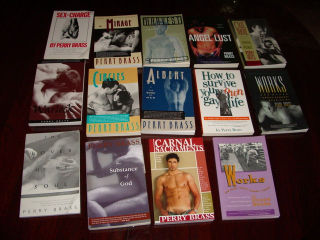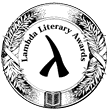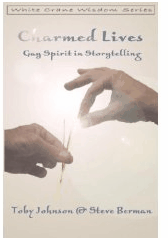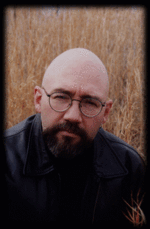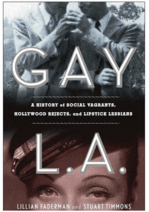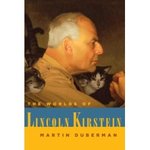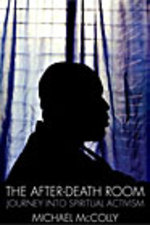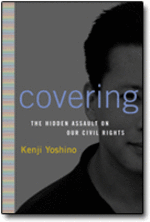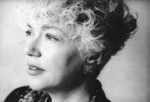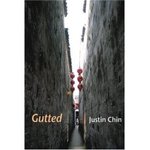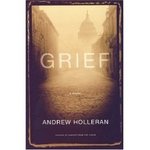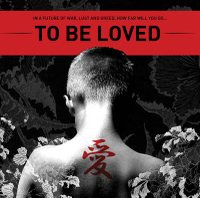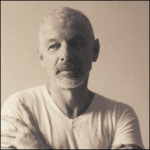Thirty Seven Ways to be Seductive with a Man by Perry Brass
One of my prime feelings lately is that too many gay men have lost the talent of being seductive—that is, understanding how to invite intimacy. A generation or two ago, it seemed to go with the territory. Maybe too many of us had seen too many old movies and knew the moves that the stars of old used, to keep them stars—but seduction I feel has become a lost art, but one which with a little practice we can bring back again. One of the sad things about this lack of seduction is that once we have lost seduction, we have also lost a lot of the way toward intimacy with each other—sexual, emotional, and otherwise.
So to reacquaint you with it, I offer 37 ways to be seductive.
1) Repeat his name after you hear it. Then say, “I like your name.” Even if you don’t and his name is Jerky McSmirk, say it. Then smile a bit, but make sure he does not feel that you are laughing at him.
2) Ask him what he does with his time that is important to him. Almost every man loves to talk about his work, and even if he doesn’t he will have something that he likes to do with his time and is waiting for someone to ask.
3) Keep his hand in yours for more than moment, but not long enough to embarrass him if he is embarrassed by public displays of affection.
4) Touch him behind the ear or neck. Very gently.
5) Get close enough to him that he can smell your breath, and make sure that your breath is worth smelling.
6) Tell you like . . . the way he smells, his skin feels, his eyes look—something completely personal.
7) Invite him to sit down with you.
8) Invite him to stand up, go to the bar, go outside for a breath of air; anything, just invite him to do it, so he knows you are including him in your plans.
9) Ask him how he feels. And repeat the question often. In most of “normal” life, no one cares how men feel. It is considered uncool to ask. Don’t be afraid of being uncool. Cool is for kids. Warm is for men.
10) Ask him to taste what you are drinking. And then smile.
11) Offer to buy him a drink. Or, if not a drink, then something else. Don’t offer this to reciprocate for something he has already done; make it a freewill offering. If it is simply tit-for-tat (whatever the hell that means), it loses a lot of its seductive power and even your tit may start to pale compared to his tat.
12) If you offer him a business card (and people do nowadays), write something on the back of it that is personal, even if it’s just your signature and “call.”
13) Touch his hair or forehead lightly with your fingers and smile while you’re doing this.
14) Sophia Loren was once asked who was the most seductive man she had ever met. “Cary Grant. We met on a plane. What struck me immediately was how he smelled, with a very subtle citrus cologne, and how nice his manners were. So many men use bad manners to seduce, and that’s bad.”
Learn something from that.
15) Wherever you are, find an excuse to invite him outside for a moment. Then enjoy the fact that the two of you are breathing the same air without a lot of other people breathing it.
16) Invite him to your—whatever. Apartment, palatial estate in Hoboken, hotel room, or even the curb where your car is parked, or the curb next to the subway entrance. But make sure he knows this invitation comes from you.
17) Ask him out for something. If he asks if this is a “date,” say, “No, but I just thought we’d get to know each other and have fun.”
18) There is nothing so seductive as a man who knows when to laugh at the right time. Never laugh at him, unless of course the whole situation at some point becomes so absurd that even while laughing at him, you are really laughing at yourself.
19) At some point make sure that your cheek is close to his. You can do this by getting close enough to him to whisper into his ear. There is something tingling and nice about having someone whisper into your ear anyway, but having your cheek next to his cheek means that you are inviting intimacy, something that most men find appealing, even if they are not capable of doing it themselves.
20) When he shows up at your apartment, tell him how much nicer he looks without a lot of people around him.
21) Don’t expect him to sit next to you his first time in your “space”; allow him to have some other alternative seating. And don’t take offense if he does not sit with you. He may be too shy to plump down next to you when he hardly knows you.
22) But this should not keep you from approaching him and smiling.
23) Always offer a man something to eat. It may be light, but it should have some texture to it. If he’s nervous at your first meeting, having something like celery or carrots around for munchies can be good. Don’t just offer him a drink. Although “liquor is quicker,” it often makes men feel out of control.
24) Sex and intimacy are great appetite suppressants, which is probably the reason why so many people are over-weight now: they don’t get enough of either. So if things heat up, dinner can wait.
25) Admire something he’s wearing, then tell him, smiilng, how much better he might look without it.
26) Don’t jump all over him. Let him have a moment to enjoy the intimacy of physical closeness with you. Sexual dysfunction is now on the rise, and part of that may be that people expect too much to happen too fast, in an already stressful work-driven culture. So no matter what “deed” happens, enjoy the fact that he is there enjoying you.
27) Ask him, “Is there anything we can do that would make you more comfortable?” If he hesitates, then tell him what would you more comfortable.
28) Try taking off your shoes, and then his.
29) Massage his shoulders. Most men carry huge tension in them. Use a light touch, and don’t try to do anything unexpected that would surprise or bother him.
30) Point out something around the apartment or space that interests you, and talk about it in a way that can bring him into the picture. (“Do you have anything like that? What do you usually show your friends?”)
31) Turn the music to something that is soft, no matter what your taste in sound is. Never make either of you talk over the music, and if the news is on turn it off.
32) Bring out some pictures to look at it. And invite him to sit closer to you.
33) When you are sitting closer, have at least one part of your body (an elbow, knee, hand, or shoulder) touch his.
34) If you offer him something to eat, give him a moment to try it without being all over him. Seduction requires a moment for him to enjoy being near you without you being aggressive about it. So, draw away from him for a moment while he eats. Or drinks.
35) If you feel that he is withdrawing from you (and sometimes this happens from nerves or self-consciousness), then take a breather. Don’t get into his face, but back off a bit, and then come back with (in a nice, non-threatening way): “What’s your day been like?” Get him to talk. Again, most men are never asked about their feelings or themselves unless it has to do with work and is done in a threatening or challenging way. So the fact that you are not asking in a threatening way is wonderful.
36) Touch his shoulders gently. And then work your way up to his ear or face: gently. Kiss him, but not on the lips. Now start to touch his chest, and unbutton a button or two. After unbuttoning a few buttons, stop, kiss him, then begin unbuttoning or removing more.
37) Once things get down to bare skin, tell him you did not expect him to look so good with his clothes off. And then say, “I really like your shoulders (or chest, or neck, or arms, or . . . ). Most men love having their bodies complimented. And, if he does have a great body, and it’s too obvious that he’s spent time on it, tell him, “You should keep your clothes off all the time.” In other words, you are not so foolishly “cool” and self-involved that you are going to ignore something that means a lot to him.
These are only 37 ways: there are about 100 more, but these are a good start.
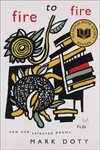 were recently married in Massachusetts. Like Augusten Burroughs’s memoirs, and David Sedaris’s humor, Mark Doty’s poetry appeals to all readers regardless of sexual orientation. Needless to say, it is a great distinction for an out Gay poet to be honored, not as an "American Gay poet," but as an American poet, period. Doty’s honor was well-deserved. (He is, by the way, also the judge for the 2008 White Crane James White Poetry Prize, the winner of which will be announced in the spring issue of White Crane.)
were recently married in Massachusetts. Like Augusten Burroughs’s memoirs, and David Sedaris’s humor, Mark Doty’s poetry appeals to all readers regardless of sexual orientation. Needless to say, it is a great distinction for an out Gay poet to be honored, not as an "American Gay poet," but as an American poet, period. Doty’s honor was well-deserved. (He is, by the way, also the judge for the 2008 White Crane James White Poetry Prize, the winner of which will be announced in the spring issue of White Crane.)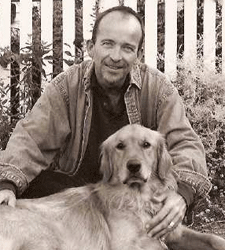 Doty’s NBA acceptance speech was one of the most inspirational I have seen or heard in quite a while. Unfortunately, I had to go to the National Book Awards Web sit to see and hear Doty’s acceptance speech, and those of the other NBA winners. That is because, unlike awards ceremonies honoring movies, recorded music, television or theater, literary awards are never televised, except perhaps on C-SPAN (which, as the saying goes, “nobody watches”). The fact that literary awards are almost never televised is an indication of literature’s low standing in modern American society, gay or straight. While the major networks know that broadcasting the Oscars, the Grammys, the Emmys or the Tonys will win them large audiences, televising the National Book Awards would almost certainly be a ratings disaster and, even worse, drive away the advertisers.
Doty’s NBA acceptance speech was one of the most inspirational I have seen or heard in quite a while. Unfortunately, I had to go to the National Book Awards Web sit to see and hear Doty’s acceptance speech, and those of the other NBA winners. That is because, unlike awards ceremonies honoring movies, recorded music, television or theater, literary awards are never televised, except perhaps on C-SPAN (which, as the saying goes, “nobody watches”). The fact that literary awards are almost never televised is an indication of literature’s low standing in modern American society, gay or straight. While the major networks know that broadcasting the Oscars, the Grammys, the Emmys or the Tonys will win them large audiences, televising the National Book Awards would almost certainly be a ratings disaster and, even worse, drive away the advertisers.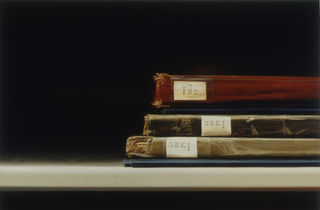 For generations of Gay men, Lesbian women, bisexuals and transgender people, books were an important part of the coming out process. Books like Malcolm Boyd's Take Off the Masks, Radclyffe Hall's The Well of Loneliness, Donald Webster Cory's The Homosexual In America, Christine Jorgensen’s Personal Autobiography, Rita Mae Brown's Rubyfruit Jungle or Patricia Nell Warren's The Front Runner, helped many of us come to terms with our own sexual or gender identity.
For generations of Gay men, Lesbian women, bisexuals and transgender people, books were an important part of the coming out process. Books like Malcolm Boyd's Take Off the Masks, Radclyffe Hall's The Well of Loneliness, Donald Webster Cory's The Homosexual In America, Christine Jorgensen’s Personal Autobiography, Rita Mae Brown's Rubyfruit Jungle or Patricia Nell Warren's The Front Runner, helped many of us come to terms with our own sexual or gender identity. 